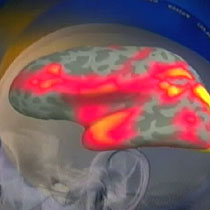-
(单词翻译:双击或拖选)
Washington
13 April 2007
Researchers studying how the brain works say they have begun to be able to see a thought as it forms in the human mind. Scientists in Germany at the Max Planck Institute for Human Cognitive1 and Brain Sciences say their brain scans at the moment a person makes a mental choice could have big implications for efforts to control many difficult mental disorders3. VOA's Paul Sisco reports.

Brain scan illustration of thought formation
Scientists at the Max Planck Institute in Germany want to know how thought works. They report their sophisticated scans have captured images of the human brain making a choice. Some say this has clarified the physical basis of free will.
The process involves magnetic resonance4 imaging that essentially5 illustrates6 what a person's intention is -- what thought the subject is forming -- from a detailed7 computer analysis of brain activity patterns.
John Dylan-Haynes leads the research. "We used a technique where you basically shine like a torch around the brain to visualize8 that, you search through the brain for regions where you can tell what a person is intending to do," he explains, "and we found such a reason that was very powerful in telling what a person's current plans are."
In the medial prefrontal cortex, they discovered slight differences in patterns of activity when subjects were asked to choose whether to add or subtract two numbers. Brain-scan images were taken at the moment they chose either "add" or "subtract." After hundreds of tests, the data began to form recognizable patterns.
The green regions on an image of the brain are where intentions or plans are stored. The red is where actions are being carried out in the moment. "Apparently9 when our plans are carried into execution, they get copied to a different part of the brain to be executed," explains Dylan-Haynes.
Tanya Steinbach was a study participant. "You are just told to focus on the task, and that is normally what you do. Sometimes, you know, I had to force myself to stay awake, because it's a little tiring..."
In the Hollywood film "Minority Report," authorities use mind-reading technology to target individuals. Is that a concern?
Professor Colin Blackmore oversees10 the research at the Max Planck Institute. "Can we look forward to a world in which we will be scanned as we walk through airports, and they will know all about us and what we are thinking? Not only do I think that is unlikely, but it is important to point out that scientists have started to think about those issues already."
He says this kind of basic research has enormous potential for medical science. "There are very serious cognitive conditions like autism, schizophrenia, obsessive11 compulsive disorder2, in which people have difficulty in controlling their own intentions and actions," adds Blackmore.
A skeptic12 says the effort in Germany is aimed at "machines that can look into your soul," but the scientists hope their research will lead to new understanding of these perplexing and difficult disorders.
 收听单词发音
收听单词发音
1
cognitive

|
|
| adj.认知的,认识的,有感知的 | |
参考例句: |
|
|
|
2
disorder

|
|
| n.紊乱,混乱;骚动,骚乱;疾病,失调 | |
参考例句: |
|
|
|
3
disorders

|
|
| n.混乱( disorder的名词复数 );凌乱;骚乱;(身心、机能)失调 | |
参考例句: |
|
|
|
4
resonance

|
|
| n.洪亮;共鸣;共振 | |
参考例句: |
|
|
|
5
essentially

|
|
| adv.本质上,实质上,基本上 | |
参考例句: |
|
|
|
6
illustrates

|
|
| 给…加插图( illustrate的第三人称单数 ); 说明; 表明; (用示例、图画等)说明 | |
参考例句: |
|
|
|
7
detailed

|
|
| adj.详细的,详尽的,极注意细节的,完全的 | |
参考例句: |
|
|
|
8
visualize

|
|
| vt.使看得见,使具体化,想象,设想 | |
参考例句: |
|
|
|
9
apparently

|
|
| adv.显然地;表面上,似乎 | |
参考例句: |
|
|
|
10
oversees

|
|
| v.监督,监视( oversee的第三人称单数 ) | |
参考例句: |
|
|
|
11
obsessive

|
|
| adj. 着迷的, 强迫性的, 分神的 | |
参考例句: |
|
|
|
12
skeptic

|
|
| n.怀疑者,怀疑论者,无神论者 | |
参考例句: |
|
|
|















